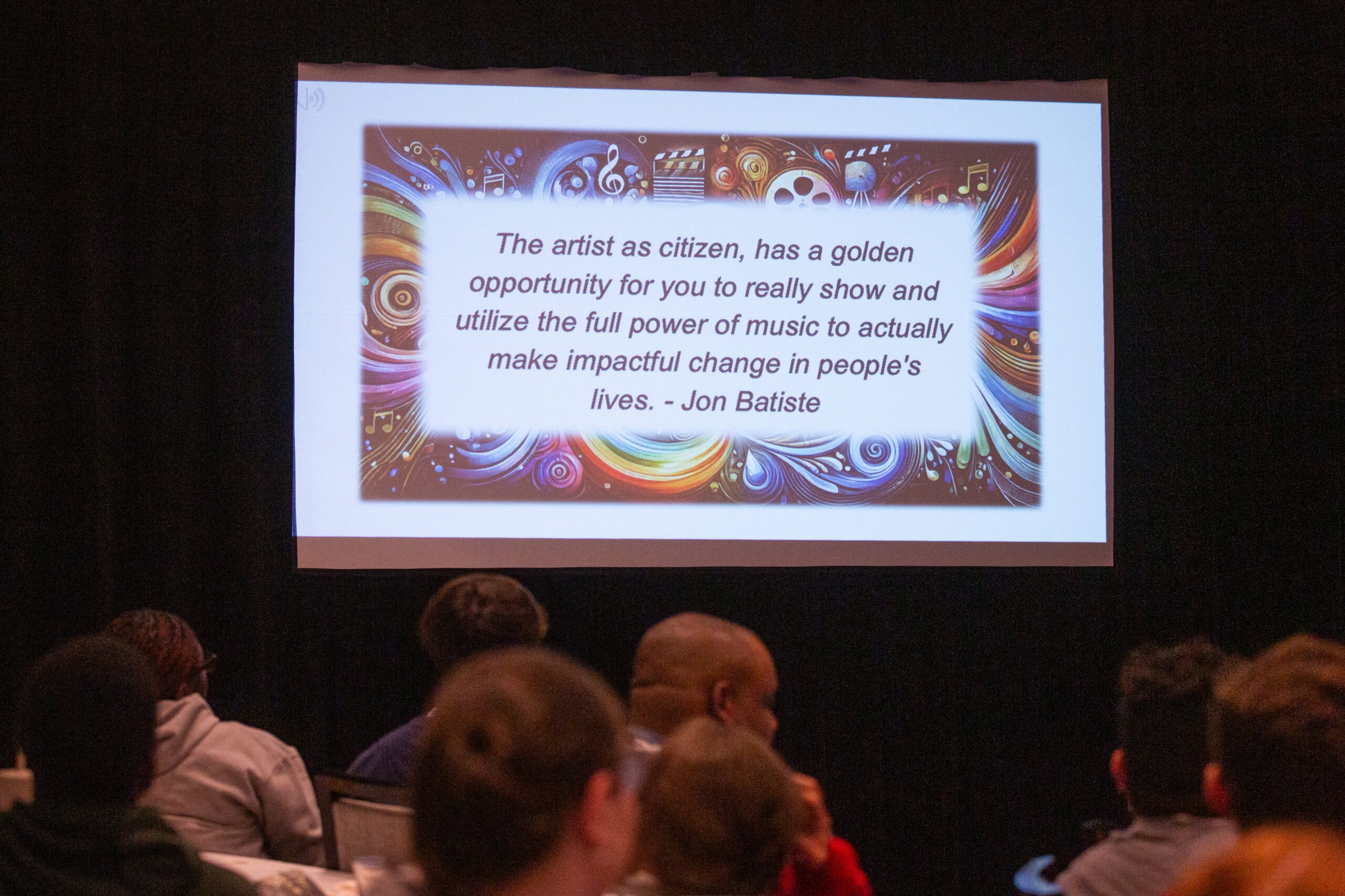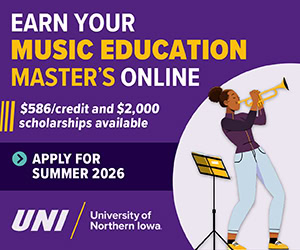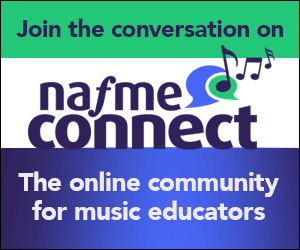/ News Posts / Prioritizing Self-Care for Music Educators
When Caring for Others Becomes Too Much
Prioritizing Self-Care for Music Educators
By NAfME Member José Valentino Ruiz, Ph.D.
As the new academic year begins, music educators across the country are preparing to inspire their students, lead ensembles, and foster a love for music. Your passion for teaching is undeniable—you pour your heart into every lesson plan, rehearsal, and student interaction. But in this selfless pursuit, it’s easy to lose sight of your own needs, dreams, and aspirations. When caring for others becomes too much, it can lead to burnout, diminished creativity, and a disconnect from the very passions that drew you to music education in the first place. This article explores the challenges of overextending yourself, the importance of self-care, and how prioritizing your own aspirations can make you a more effective and fulfilled educator.
The Selfless Nature of Music Educators
Music educators are often the epitome of selflessness. You stay late to help a struggling student, volunteer for extracurricular performances, and adapt your curriculum to meet the demands of school leadership. This giving nature is a strength, but it can also be a double-edged sword. Research suggests that educators, particularly those in the arts, are at high risk for burnout due to the emotional and physical demands of their roles (Bakker & Demerouti, 2017). The constant pressure to meet external expectations—whether from administrators, parents, or students—can lead you to sacrifice your personal goals, such as pursuing your own musical projects, professional development, or even basic self-care.
When you overextend yourself, you may feel drained, uninspired, or disconnected from the dreams that once fueled your career. For many music educators, the aspiration to compose, perform, or explore new teaching methods gets buried under the weight of daily responsibilities. This loss of personal fulfillment doesn’t just affect you—it impacts your students. A study by Maslach and Leiter (2016) highlights that burnout in educators can reduce teaching effectiveness, lower student engagement, and create a less vibrant classroom environment. When you neglect your own needs, your ability to inspire and connect with your students diminishes.
The Cost of Neglecting Self-Care
Neglecting self-care isn’t just a personal issue; it’s a professional one. Music educators often face unique challenges: managing large ensembles, navigating budget constraints, and balancing creative expression with standardized curricula. These demands can lead to emotional exhaustion, where you feel you have nothing left to give. According to a study in the Journal of Music Teacher Education, music educators frequently report feeling overwhelmed by administrative expectations, which can stifle their creativity and passion for teaching (Hancock, 2016).
When you prioritize others’ needs over your own, you risk losing the spark that makes you a unique educator. Perhaps you once dreamed of composing a piece for your choir, attending a music conference, or learning a new instrument. These aspirations are not frivolous—they are the fuel that keeps you inspired. When you sacrifice them to conform to external pressures, you may feel unfulfilled, which can manifest as resentment, fatigue, or even a desire to leave the profession. Conversely, nurturing your own goals can reinvigorate your teaching, making you a more authentic and engaging educator.
Why Self-Care Makes You a Better Educator
Prioritizing self-care and personal aspirations isn’t selfish—it’s essential. When you are fulfilled, you bring more energy, creativity, and enthusiasm to your classroom. Research supports this: Educators who engage in self-care practices, such as setting boundaries and pursuing personal interests, report higher job satisfaction and better student outcomes (Jennings & Greenberg, 2009). For music educators, this might mean carving out time to practice your instrument, attending a workshop to explore new teaching techniques, or simply taking a moment to reflect on what brings you joy.
Your personal aspirations are also a powerful example for your students. When you pursue your own musical goals—whether it’s performing in a local ensemble or experimenting with a new composition—you model lifelong learning and passion. This authenticity inspires students to take risks, explore their own creativity, and see music as a lifelong pursuit. By prioritizing yourself, you create a ripple effect that enhances your teaching and enriches your classroom.
Balancing School Expectations with Personal Goals
One of the greatest challenges for music educators is navigating the expectations of school leadership while staying true to their personal goals. Schools often prioritize standardized outcomes, such as test scores or uniform curricula, which can feel at odds with the creative and individualized nature of music education. This tension can lead you to set aside your own aspirations to meet administrative demands, such as organizing school-wide events or aligning lessons with non-musical objectives. However, suppressing your creativity to conform can erode your sense of purpose and diminish the unique value you bring to your school.
To balance these pressures, it’s crucial to advocate for your role as a music educator and the importance of your personal growth. Research shows that teachers who actively negotiate their professional boundaries—by communicating their needs and aligning personal goals with school objectives—are less likely to experience burnout and more likely to remain engaged in their work (Skaalvik & Skaalvik, 2018). For example, you might propose a project that integrates your personal musical interests, such as a student-led composition workshop, into the curriculum. This not only fulfills your creative aspirations but also enhances student learning by showcasing your passion.
Start by identifying one or two personal goals that align with your school’s mission. For instance, if you’ve always wanted to explore jazz improvisation, consider introducing a jazz unit that excites both you and your students. Communicate these ideas to your administration, emphasizing how they benefit the school community. By framing your aspirations as assets, you can carve out space for your own growth while meeting professional obligations. This balance ensures that you remain a vibrant, inspired educator who brings authenticity to the classroom.
Practical Steps to Prioritize Self-Care
To help you balance caring for others with caring for yourself, here are five practical steps to implement as the academic year begins:
- Set Boundaries: Establish clear limits on your time and energy. For example, designate specific hours for grading or student meetings and stick to them. Politely decline non-essential tasks that don’t align with your priorities.
- Reconnect with Your Passions: Identify one personal aspiration—whether it’s composing, performing, or learning a new skill—and dedicate time to it each week. Even 30 minutes can make a difference.
- Practice Mindfulness: Incorporate mindfulness techniques, such as deep breathing or journaling, to manage stress and stay grounded. Apps like Headspace or Calm can be helpful starting points.
- Seek Support: Connect with colleagues or join a professional organization like the National Association for Music Education to share challenges and ideas. Peer support can help you feel less isolated.
- Reflect and Adjust: At the end of each month, reflect on your self-care practices and teaching goals. Are you making progress toward your aspirations? Adjust your schedule or priorities as needed.
A New Mindset for a New Year
As you embark on this academic year, remember that caring for yourself is not a luxury—it’s a necessity. If you prioritize your own aspirations and balancing school expectations with personal goals, you preserve the passion that makes you an exceptional music educator. You don’t have to abandon your commitment to your students or school; instead, view self-care as a way to enhance your teaching and inspire those around you. Let this be the year you reclaim your dreams, set boundaries, and model the joy of music for your students. When you thrive, your classroom thrives too.
References
Bakker, A. B., & Demerouti, E. (2017). Job demands–resources theory: Taking stock and looking forward. Journal of Occupational Health Psychology, 22(3), 273–285.
Hancock, C. B. (2016). Music teacher stress and burnout: Implications for the profession. Journal of Music Teacher Education, 26(1), 10–22.
Jennings, P. A., & Greenberg, M. T. (2009). The prosocial classroom: Teacher social and emotional competence in relation to student and classroom outcomes. Review of Educational Research, 79(1), 491–525.
Maslach, C., & Leiter, M. P. (2016). Understanding the burnout experience: Recent research and its implications for psychiatry. World Psychiatry, 15(2), 103–111.
Skaalvik, E. M., & Skaalvik, S. (2018). Job demands and job resources as predictors of teacher motivation and well-being. Social Psychology of Education, 21(5), 1251–1275.
At top: Photo © 2025 Ashlee Wilcox Photography, LLC
About the author:
 NAfME member José Valentino Ruiz, Ph.D. is an EMMY® and multi–GRAMMY® Award-winning producer, educator, and entrepreneur. He serves as Associate Professor and Program Coordinator of Music Business & Entrepreneurship at the University of Florida and is a U.S. Cultural Diplomat with the U.S. Department of State. For more information, visit: www.josevalentino.com.
NAfME member José Valentino Ruiz, Ph.D. is an EMMY® and multi–GRAMMY® Award-winning producer, educator, and entrepreneur. He serves as Associate Professor and Program Coordinator of Music Business & Entrepreneurship at the University of Florida and is a U.S. Cultural Diplomat with the U.S. Department of State. For more information, visit: www.josevalentino.com.
Did this blog spur new ideas for your music program? Share them on Connect! Interested in reprinting this article? Please review the reprint guidelines.
The National Association for Music Education (NAfME) provides a number of forums for the sharing of information and opinion, including blogs and postings on our website, articles and columns in our magazines and journals, and postings to our Connect member portal. Unless specifically noted, the views expressed in these media do not necessarily represent the policy or views of the Association, its officers, or its employees.
Published Date
August 19, 2025
Category
- Careers
- Retention
- Teacher Self Care
Copyright
August 19, 2025. © National Association for Music Education (NAfME.org)








